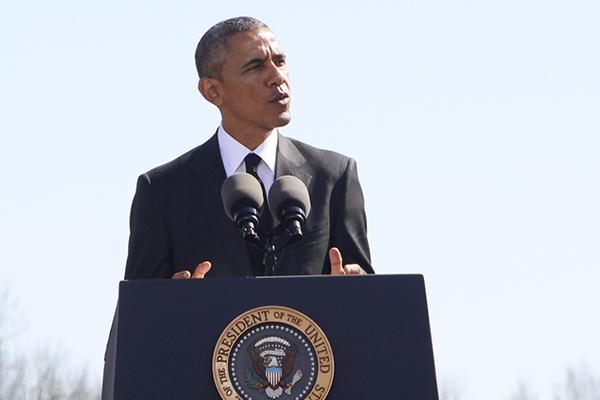Obama spoke before an estimated 40,000 people, including more than 100 members of Congress. He was introduced by Rep. John Lewis of Georgia, a civil rights leader from Alabama who helped organize the voting rights protests in Selma.
“On that day, 600 people marched into history, walking two-by-two down the sidewalk,” Lewis said.
Lewis said he is inspired by the progress made since Bloody Sunday, but there is still room for the country to grow.
“There’s still work left to be done,” he said. “Get out there and push and pull until we redeem the soul of America.”
President Obama echoed Lewis, comparing last year’s events in Ferguson, Missouri, to the 1965 march on Selma and the violence that ensued as a result. The speech came just days after the Justice Department released its 102-page report detailing a system of racial discrimination within the Ferguson Police Department.
“We just need to open our eyes and our ears and our hearts to know that this nation’s racial history still casts its long shadow upon us,” he said. “We know the march is not over yet, we know the race is not yet won. We know reaching that blessed destination where we are judged by the content of our character requires admitting as much.”
However, he said, America has made significant steps in the right direction in the last 50 years. He said though there is work to be done, it is necessary to recognize the progress that has been made.
“We do a disservice to the cause of justice by intimating that bias and discrimination are immutable or that racial division is inherent to America,” he said. “If you think nothing’s changed in the past 50 years, ask somebody who lived through the Selma or Chicago or L.A. of the ’50s. Ask the female CEO who once might have been assigned to the secretarial pool if nothing’s changed. Ask your gay friend if it’s easier to be out and proud in America now than it was 30 years ago. To deny this progress – our progress – would be to rob us of our own agency; our responsibility to do what we can to make America better.”
Also in attendance was Elisabeth Omilami, daughter of civil rights activist Hosea Williams, who was the leader of the Southern Christian Leadership Conference alongside Martin Luther King, Jr. She said she hopes her father’s legacy can carry on today in order to fight prejudice in this country.
“America is a young country,” she said. “She is like a teenager. She has so much to learn and I hope that she can listen to the people.”
Like many others, Brenda M. Martin, a Buffalo, New York, native now living in Huntsville, said she brought her daughter and grandchildren to Selma for the president’s speech in order to reflect on an important historical era.
“The main thing we wanted to do was get the opportunity to walk across the bridge,” she said. “That is going to speak volumes for us in our own family history.”
Nigel McWilliams, a senior majoring in media production from Selma, said though the president’s visit to Alabama was historic and moving, he believes there is much more that needs to be done in order to make a tangible difference.
“Yes, this is a cool celebration,” he said. “But what are we going to do? We can come out and celebrate here all day, but what are we going to do as a people? Not just black people, but all people.”







